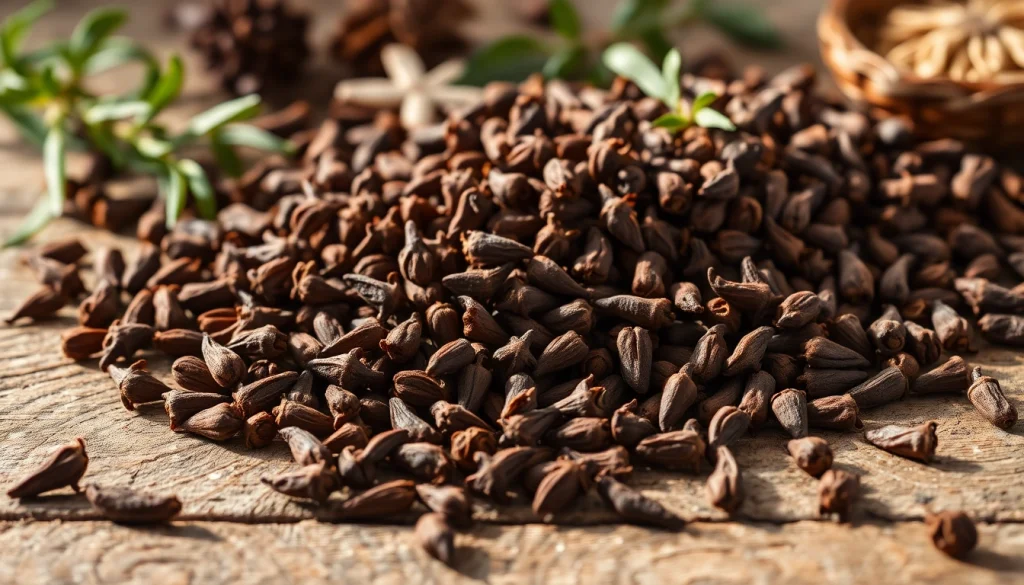
Introduction to Cloves
Cloves are not only known for their unique flavor but also for their far-reaching health benefits and culinary versatility. These cloves are the aromatic flower buds of a tropical evergreen tree, Syzygium aromaticum, part of the Myrtaceae family. Originating from the Maluku Islands of Indonesia, cloves have made their mark in global cuisine and medicine for centuries. Their pungent and sweet aroma has captured the attention of chefs, health enthusiasts, and herbalists alike.
What are Cloves?
Cloves are the dried flower buds harvested from the clove tree, characterized by their distinctive brown color and nail-like appearance. Each clove bud contains a powerful combination of essential oils, primarily eugenol, which accounts for its unique flavor profile and numerous health benefits. When dried, these buds develop intense aroma and flavor, making them an important spice in various culinary traditions around the world, particularly in Indian and Middle Eastern cuisine.
Culinary Uses of Cloves
Cloves are a staple ingredient in many global dishes, renowned for their warm, sweet, and slightly bitter taste. They are commonly used in spice blends such as garam masala, pumpkin spice, and chai masala. In addition to being used in savory dishes such as stews and curries, cloves also play a significant role in baking, enhancing flavors in desserts like pies, cookies, and fruit compotes. The versatility of cloves extends beyond cooking; they are also incorporated into beverages like mulled wine and spiced teas.
Origins and History of Cloves
Cloves have a rich history that dates back to ancient times. They were highly prized in trade because of their flavor and medicinal properties. The clove trade routes stretched across Asia to Europe, where they were used not only as a spice but also as a preservative. Historical records indicate that cloves were a key factor in the spice trade’s prosperity, influencing global economics and politics.
After being cultivated in Indonesia, the cultivation of cloves expanded to other regions such as Zanzibar and Madagascar, contributing to their widespread availability today. Their cultural significance can be seen in various traditions, where cloves are used in religious ceremonies and traditional medicinal practices.
Health Benefits of Cloves
The health benefits of cloves are well-documented, making them more than just a culinary ingredient. They possess several compounds that provide therapeutic effects, transforming them into a valuable addition to holistic health regimens.
Rich Nutritional Profile
Cloves are nutrient-dense, offering an array of vitamins and minerals, including manganese, vitamin C, and vitamin K, as well as dietary fiber. A tablespoon of ground cloves contains about 30 calories and is packed with nutrients, making it easy to incorporate into diets. Manganese, in particular, plays a role in bone health, metabolic regulation, and antioxidant production, contributing to overall wellness.
Potential Medicinal Uses
In traditional medicine, cloves have been utilized for their analgesic and antiseptic properties. Clove oil, extracted from the buds, is often used for dental pain relief and has been found effective in combatting oral bacteria due to its antimicrobial properties. Moreover, cloves may assist in digestion, reducing bloating and discomfort. Several studies suggest that cloves can improve liver health by enhancing the detoxification process, further solidifying their reputation as a medicinal herb.
Antioxidant Properties
Cloves have a high level of antioxidants, which help combat oxidative stress in the body. The antioxidants present in cloves, particularly eugenol, can neutralize free radicals, potentially reducing the risk of chronic diseases such as heart disease and cancer. Sufficient antioxidant intake is crucial for maintaining cellular health and promoting longevity, making cloves an excellent dietary addition to support overall wellness.
How to Use Cloves in Cooking
Incorporating cloves in your cooking can elevate flavors and enhance your dishes significantly. Here are some practical ways to utilize cloves in your culinary endeavors.
Spicing Up Your Recipes
Cloves are versatile enough to be used in both savory and sweet dishes. When cooking meats, adding whole cloves to braises and slow-cooked recipes can infuse a rich flavor. For desserts, ground cloves can enhance the profile of baked goods like gingerbread, spice cakes, and seasonal treats. A common approach is to combine cloves with other spices such as cinnamon and nutmeg for a balanced flavor blend.
Best Pairings and Combinations
Cloves harmonize well with various flavors. Common pairings include:
- Cinnamony spices (e.g., cinnamon, nutmeg, allspice)
- Fruits (e.g., apples, pears, cranberries)
- Meats (e.g., beef, lamb, pork)
- Sweeteners (e.g., brown sugar, honey)
Exploring combinations of these flavors can yield delightful culinary results, particularly in stews, marinades, and even fruit-based dishes.
Cooking Techniques for Clove Usage
When using whole cloves, consider the best cooking methods to extract their full flavor. Whole cloves can be added directly to soups, stews, or marinades. However, for a more potent flavor, you can toast them lightly in a dry pan before adding to your dishes. Ground cloves, on the other hand, integrate effortlessly into spice blends and batters, adapting to various forms, whether in savory or sweet preparations.
Cloves in Alternative Medicine
Beyond the culinary realm, cloves hold significance in alternative medicine due to their numerous therapeutic properties. Various applications showcase their effectiveness in promoting health and wellness.
Traditional Remedies with Cloves
Cloves have a long history of use in traditional herbal remedies. They are commonly employed to alleviate respiratory issues, thanks to their antimicrobial properties. Infusions made from clove buds are often consumed to soothe sore throats and combat coughs, while clove tea can help with digestive ailments. Additionally, cloves have been utilized in Ayurveda and Traditional Chinese Medicine for their warming properties, helping to stimulate circulation and support digestive health.
Clove Oil and Its Uses
Clove essential oil is renowned for its therapeutic benefits. Commonly used in aromatherapy, it acts as a natural pain reliever and can alleviate muscle soreness when mixed with carrier oils for topical application. Due to its antiseptic qualities, clove oil is also used in oral care products to relieve toothache, reduce gum inflammation, and fight bad breath. Users should exercise caution when using clove oil, as it is potent and should be diluted for safety.
Safety and Precautions
While cloves offer numerous health benefits, certain precautions should be considered before use. Clove oil, for example, should not be ingested in large quantities and is not recommended for pregnant women or those with bleeding disorders, especially as it may affect blood clotting. It is advisable to consult a healthcare provider before incorporating cloves or clove oil into your routine, especially for individuals with underlying health conditions.
Buying and Storing Cloves
To make the most of cloves, it is essential to understand how to choose and store them effectively. Here are some best practices to keep in mind.
Choosing Quality Cloves
When purchasing cloves, look for whole cloves that are dark brown and have a strong aroma. Quality cloves should be plump and retain their fragrance, indicating freshness. Ground cloves should be purchased in small quantities to ensure potency, as their flavor diminishes over time. Consider sourcing cloves from reputable suppliers known for their quality, such as specialty spice shops or certified organic vendors.
Storage Tips for Freshness
To preserve the flavor and aromatic properties of cloves, store them in an airtight container in a cool, dark place. Whole cloves have a longer shelf life than ground ones, lasting up to a year when stored correctly. Ground cloves should ideally be used within six months for optimal flavor. To maintain freshness, avoid exposing cloves to moisture or direct sunlight.
Alternative Forms of Cloves
Besides whole and ground cloves, other forms include clove essential oil and clove extract. Each form offers differing uses; while essential oil is primarily utilized for therapeutic and aromatic benefits, extracts can enhance flavor in various recipes. Individuals may choose the form that best suits their needs, but it’s important to follow dosage guidelines, especially with concentrated forms like oils and extracts.
Conclusion
From their captivating history to their diverse uses in cooking and health, cloves present a fascinating spice with significant benefits. Whether used to enhance flavor in recipes or as a holistic remedy, these aromatic buds are a valuable addition to any kitchen or wellness routine. Their rich flavor, combined with remarkable health properties, ensures that cloves will continue to be cherished by culinary experts and health advocates alike.






